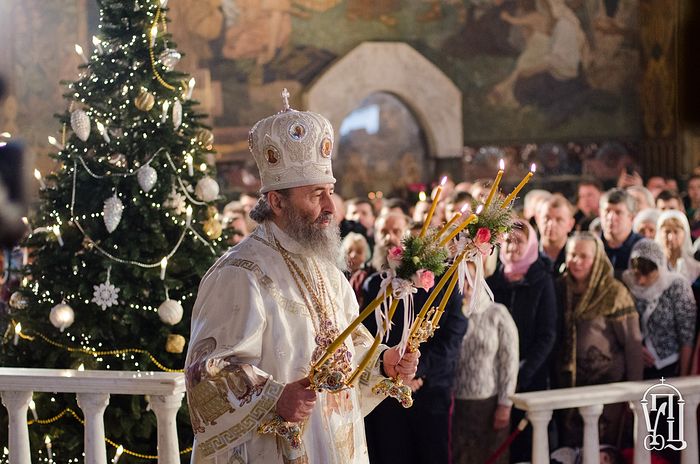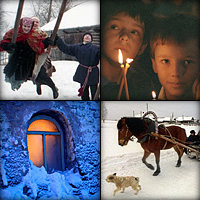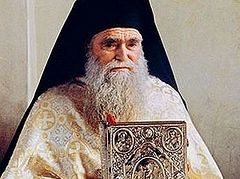To the archpastors, pastors, monastics,
and all the faithful children of the Ukrainian Orthodox Church
I heartily congratulate all of you, God-loving bishops, reverend fathers, pious monks and nuns, dear brothers and sisters, with the great salvific feast of the Nativity in the flesh of our Lord, God, and Savior Jesus Christ.
Recollections of the great and sacred event of the Nativity of Christ again lead us to Bethlehem, where under the cover of the blessed night occurred the great mystery of the coming of God in the flesh: Into the world was born the God of gods, and King of kings (Dan. 2:47, Rev. 19:16). The poor Bethlehem cave became the chamber for the Heavenly King, and the humble manger became the holy throne, where He Who adorns the heavens with clouds (Ps. 146:8) and holds all ends of the earth in His hands (Ps. 94:4-5) was adorned in swaddling clothes.
The Nativity of Christ has bowed the Heavens to the earth. The great mystery of godliness is completed, in which mercy and truth meet, and righteousness and peace have kissed each other (Ps. 84:11). And it all happened because God, Whom the angels incessantly serve in Heaven, came to Earth to serve us, fallen and sinful men, and to give His soul for our redemption (Mt. 20:28).
The Nativity of Christ had its own celebration. When an earthly king is born, the people serve him, but when the Heavenly King was born, the angels served Him. The holy angels were flying over the Bethlehem cave singing a wondrous hymn: Glory to God in the highest, and on earth peace, good will toward men (Lk. 2:14). A holy angel appeared to the Bethlehem shepherds and said, I bring you good tidings of great joy... For unto you is born this day in the city of David a Saviour, which is Christ the Lord (Lk. 2:10-11).
The Nativity of Christ brought to the world many great and wondrous Divine gifts, one of which is joy. From the Fall of Adam, mankind had lost its joy. Adam, after being expelled from Paradise, mourned his entire earthly life, and wept bitterly; and all of his descendants after him mourned. Sorrow is a spawn of sin; it is that consequence of sin that none of us love. We, sinners, love it when sin tickles our nerves and excites our perverse thoughts and feelings, but we do not love when the consequences of sin come to us: sorrow, sickness, despair, hopelessness. Many people, wanting to deliver themselves from the consequence of one sin, resort to another sin: to drunkenness, to drugs, to various kinds of immoral entertainment. In doing so, they are yet deeper immersed into the darkness of despair and hopelessness, because one sin does not destroy another, but rather multiplies it, and with it multiplies the sinful consequences for us.
The sole path to destroying sinful consequences is to destroy the sin itself. Christ the Savior, by His Nativity, by taking upon Himself our human nature, brought Divine power to Earth, with the help of which every man can and should overcome his sins, even if they are very great and heavy. Anyone can receive this Divine power. Only one thing is required from us for this: to go to the Savior and ask, “Lord, help me, for my flesh rages and cruelly suffers,” and the Lord will certainly help. From bearers of grief and sorrows, we turn into sons of joy, because, as those who have already begun to battle against sin testify, if man only begins to battle sin with the help of Divine grace, then he, more often than not, without realizing it himself, begins to experience spiritual joy which appears deep within the recesses of his soul—precisely that joy which the Son of God brought to Earth through His Nativity. Every man thirsts for this joy, but not every man knows that this joy is given to those who struggle against their personal sins. Blessed is the man who knows it, but thrice blessed is he who acts accordingly: Such a man becomes a receptacle for spiritual joy, which is the highest adornment of human life.
But, unfortunately, not everyone took comfort in the Nativity of Christ. King Herod, having heard that the Messiah was born into the world, was alarmed (Mt. 2:3). Herod was a very proud man, but a proud man can have neither joy nor peace within himself. Having heard of the Nativity of Christ, Herod became anxious and began to hunt out the Christ Child, and even sought to kill Him (Mt. 2:13). Such a trait of pride turns one away from Christ. Someone may ask why. The fact is that a proud man creates for himself a virtual, that is, artificial, world, in which he considers himself king. A proud man does not accept Christ, because Christ is the eternal, Divine Truth. He is afraid, and doesn’t want Christ the Truth to destroy his illusory world in which he lives and to deprive him of his imaginary royal crown, which he placed upon himself. What a pity that we, proud people, do not know that it’s better to be a servant of Christ than a king with the devil, because a servant of Christ is full of Divine strength, but a king with the devil is nothing but a soap bubble, adorned with a soapy crown.
We must remember this and hasten to Christ. May every one of us bring to the Newborn Savior humble gratitude for His love for us fallen men, for the humiliation that the Savior endured in order to exalt us and to return to us the lost eternal life and to give us the joy that makes our lives happy and pleasant even here, on Earth.
Again I congratulate you all, dear brothers and sisters, with the feast of the Nativity of Christ. I wish you all health, salvation, and happiness. May the grace of joy, which the Son of God brought to Earth, take up rest in our humble hearts, as He Himself, our Savior and Lord, once rested in the pure hands of His mother, the Most-Pure Virgin Mary. May joy, Divine peace, and grace fill our families, our Ukrainian land, and the whole of God’s world. Amen.
Humble
+ Onuphry
Metropolitan of Kiev and All Ukraine




